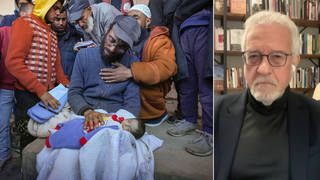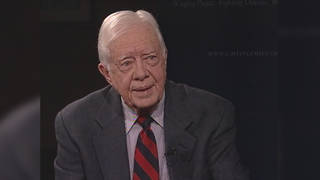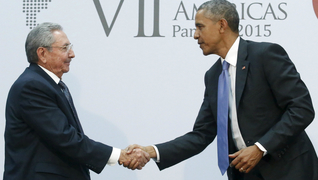
Related
Topics
Guests
- Martin Garbusattorney and member of the Cuban Five legal team. Time Magazine calls him “one of the best trial lawyers in the country,” while the National Law Journal has named him one of the country’s top 10 litigators.
We end today’s show with a story of love, birth and politics — a story some are calling “diplomaculate conception.” The wife of one of the members of the Cuban Five who was just released from prison after 16 years is expecting a baby, due in just two weeks thanks to some unusual diplomatic moves. Gerardo Hernández, the baby’s father, is one of the three former Cuban intelligence agents released as part of a prisoner swap amidst thawing ties with Cuba last week. While he was not allowed conjugal visits, Hernández was able to impregnate his wife by having his frozen sperm transferred to his wife in Panama, a process authorized by U.S. officials, funded by the Cuban government and facilitated by a staffer for Vermont Sen. Patrick Leahy. We are joined by Martin Garbus, an attorney for the Cuban Five.
Transcript
AMY GOODMAN: We end now with another story, an interesting story to do with Cuba. Juan?
JUAN GONZÁLEZ: Well, we end today’s show with a story of love, birth and politics. The wife of one of the members of the Cuban Five who was just released from prison after 16 years is expecting a baby, due just in two weeks from now. Gerardo Hernández is the baby’s father, is one of the three former Cuban intelligence agents released as part of a prisoner swap amidst thawing ties with Cuba last week. While he was not allowed conjugal visits, Hernández was able to impregnate his wife by having his frozen sperm transferred to his wife in Panama, a process authorized by U.S. officials, funded by the Cuban government and facilitated by a staffer for Vermont Senator Patrick Leahy. The process reportedly helped set a softer tone between Cuba and the United States, which culminated in the resumption of diplomatic ties and the release of two U.S. prisoners, including USAID contractor Alan Gross. And Gerardo Hernández and his wife, Adriana Pérez, are now expecting a baby girl. Senator Leahy appeared on NBC’s Today show to discuss what happened.
SEN. PATRICK LEAHY: We never said, “OK, we’ll do this, if you do that.” We just did it as a human thing. I think it impressed the Cubans. When Tim Rieser went back down later, asked to improve the conditions of Alan Gross’s prison cell, where he’s staying, they made dramatic improvements. Didn’t release him, but made dramatic improvements. And then we got a letter from her, saying that she was pregnant, and thanking us so very much. And, I mean, I feel like the godfather or something in this. I’ve never met her husband, but I’ve seen the pictures since they reunited, the joy on his face, especially the joy on hers, and they’re going to have a little girl.
AMY GOODMAN: Senator Leahy’s longtime aide is Tim Rieser, who facilitated this.
Well, for more, we’re joined by attorney Martin Garbus, who played a key role in this amazing story, a member of the Cuban Five legal team. Time magazine calls Garbus “one of the best trial lawyers in the country,” while National Law Journal has named him one of the country’s top 10 litigators.
But you performed a little different role in this. Were you there when the transfer of sperm was made, when Gerardo handed it over?
MARTIN GARBUS: I was not. I think that it speaks to the interests of Cuban people, to the interests of Gerardo, to the interests of his wife, with respect to what happened there—an exceptional couple. I think, over the years, we’ll learn more about them.
He was a man who was in prison for 16 years, did about three years in solitary confinement, never committed an infraction in prison. To never commit an infraction in prison is absolutely remarkable. It’s a very difficult thing not to do something like that. He’s a man of—I never visited him when he wasn’t up. I never visited him when he didn’t look towards a very good future with he and his wife. One of the things I asked him about, I said, “How can you have this kind of attitude when you’re in prison?” He was in a maximum-security prison. He’s an educated man. Most of the people surrounding him in prison did not have his education, did not have his politics. It was a prison—as I said, maximum security—up in Victorville, California. So you had—
AMY GOODMAN: By the way, he was spying not on the United States. He had worked with the United States. He was spying on violent anti-Cuban groups in the United States.
MARTIN GARBUS: Right. And what he said, and it directly relates to what you said—I said, “How do you get through it? How do you get through every day?” And he said, “I’m different than most of the prisoners in the prison system.” He says, “A lot of them feel that they took lives or did take lives or sold drugs.” He said, “I saved people’s lives.” He said, “Because of me, people’s lives on the island were saved. We stopped bombings. We stopped various terrorist attacks.”
AMY GOODMAN: But how did this happen, as we have just 30 seconds?
MARTIN GARBUS: This happened as part of the negotiations to—
AMY GOODMAN: How did they do it? Did they freeze the sperm?
MARTIN GARBUS: Well, the—I’m not free to talk about that.
AMY GOODMAN: Why not?
MARTIN GARBUS: And I think what happened is, it becomes part of the negotiations with Gross, and that Gross needed different conditions, wanted different conditions, and the Cubans were more than ready to make sure that he never had to suffer the same privations as Gerardo.
AMY GOODMAN: Were you involved with the negotiations, around this, around the—
MARTIN GARBUS: I can’t talk about that, either.
AMY GOODMAN: Is the baby going to look like you or him? Well, it’s quite an interesting story. And they’re going to have their baby in about two weeks?
MARTIN GARBUS: Yeah, 15 days. The baby’s name is Gena, G-E-N-A. And it was nerve-racking for some—for him to be sitting in jail while all this was going on, not knowing when and how it was going to be disclosed, and hoping for his wife’s health, while he’s sitting in sometimes solitary confinement, sometimes lockup.
AMY GOODMAN: And it all came from her approaching Senator Leahy when he was visiting Cuba?
MARTIN GARBUS: It came from the Cubans approaching Senator Leahy.
AMY GOODMAN: Well, Martin Garbus, thanks for sort of clearing that up. Attorney Martin Garbus, thanks so much for being with us, a member of the Cuban Five legal team.













Media Options